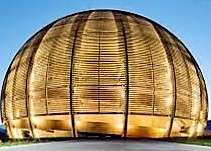Speaker
Description
Neutron-rich isotopes between Sr and Ag are thought to be synthesized in the neutrino-driven ejecta of core-collapse supernova explosions via the weak r-process [1]. Recent nucleosynthesis simulations demonstrated that (α,xn) reactions play a crucial role in the formation of these isotopes [1-4]. The rates of the (α,n) reactions are provided by the Hauser-Feshbach model. The main uncertainty of the predictions comes from the α+nucleus optical potential [2-4]. Namely, there are several parameter sets and the differences between the calculated cross sections exceed even one order of magnitude at the relevant energy region.
To constrain the parameters of the α+nucleus optical potential, recently the cross sections of the 96Zr(α,n)99Mo and 100Mo(α,n)103Ru reactions were measured [5,6] and the study of the 86Kr(α,n)89Sr reaction is in progress. The high precision experimental data was analyzed in the statistical model and it was found that the calculations with the Atomki-V2 potential [7] provide the best reproduction of the experimental data. The strongly reduced reaction rate uncertainties led to very well-constrained nucleosynthesis yields. Details on the experimental approach, the theoretical analysis and the astrophysical impact of the measurements will be presented.
[1] A. Arcones and F. Montes, Astrophys. J. 731 5 (2011).
[2] J. Pereira and F. Montes, Phys. Rev. C 93 034611 (2016).
[3] P. Mohr, Phys. Rev. C 94 035801 (2016).
[4] J. Bliss, A. Arcones, F. Montes, and J. Pereira, J. Phys. G 44 054003 (2017).
[5] G. G. Kiss et al., Astrophysical J. 908 202 (2021).
[6] T. N. Szegedi et al., Phys. Rev. C 104 035804 (2021).
[7] P. Mohr et al., Phys. Rev. Lett. 124 252701 (2020).




